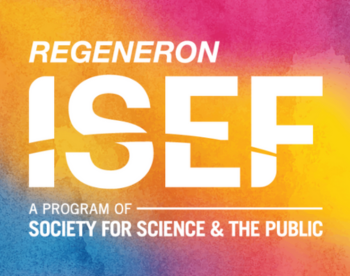The Complete Guide To Thermo Fisher Junior Innovators Challenge
What is the Thermo Fisher JIC?
JIC, formerly known as the Broadcom Masters, has been running since 2010 with the generous support of its title sponsors and partners, the Broadcom Foundation and the Society for Science.
Starting in 2023, Thermo Fisher Scientific, a global leader in scientific services, will become the new title sponsor of the association's middle school competition and use a new competition name - Thermo Fisher Scientific Junior Innovators Challenge!

ISEF's title sponsor also changed in the past two years, from Intel to the current Regeneron. The change in the title sponsor will not significantly affect the competition specifications, so there is no need to worry too much about this.
Like ISEF, the Thermo Fisher Scientific Junior Innovator Challenge cannot be directly participated in. Students need to stand out from the regional competition to get a ticket to the competition. The competition is for students in grades 6-8 in the United States. Students ranked in the top 10% in the region will be eligible to apply for the national competition.
In 2023, a total of 1,828 students from 49 states and Guam, the Northern Mariana Islands, Puerto Rico, etc. successfully entered the JIC finals.
How do I participate in Thermo Fisher JIC?
Eligibility Requirements
1. Students who have participated in the Thermo Fisher JIC-affiliate science fair in various regions between November 1, 2023 and June 1, 2024 are eligible to apply for the national competition.
Society-affiliated fairs: Science society-affiliated science fairs are science competitions that are members of the Science Society (Society) Fair Network. These competitions exist in almost every state and territory in the United States. They are held at the local, regional, state, and national levels. These fairs agree to abide by international rules and, in most cases, send high school students to participate in international science and engineering fairs. Find a society-affiliated fair in your area.
2. Applicants must be students in grades 6-8 and have participated in an affiliated fair in the United States or within the United States. Each person can only submit one entry and can participate alone or in a team of ≤3 people.
3. All research submitted must comply with the guidelines established by the Thermo Fisher JIC affiliated expo, as well as all local, state and national laws and regulations in the United States.
4. Additional team entry requirements: Each student in the team project needs to submit an application independently, handle application questions, and clearly describe their own responsibilities and understanding of the project in the application form. The descriptions between teammates will be similar, but they must be written independently. Except for the abstract, no papers and written responses can be exactly the same. There is no fee for students to apply online.
5. Team projects do not require everyone to participate, and individual entries are accepted. During the national competition review process, the group will not be considered as a whole, and only some of its members may be rated as Top300 or Finalist finalists.
View the official entry rules for the 2024 junior innovators challenge here
2023-2024 Project Categories
As a nominee, students will choose a category from the following list in their application. As a contestant, when choosing a project category, you should consider which expert can best understand the project, regardless of the topic. For example, if your research topic is related to COVID-19, but you developed a computer program or app for a real-world project, you may want an expert in computer science and software engineering to read your project. The project category will determine expertise for the initial review only. The top 300 Junior Innovators and 30 Finalists are selected without regard to category; therefore, winners may not be proportional by category.
These categories may not be the same as those at your local science fair. Here’s a helpful tip to help you choose: Consider what type of scientist or educator would best understand your project. You can read the project category descriptions here.
| Project Categories | ||
| Animal Science | Energy & Sustainability | Medicine & Health Sciences |
| Behavioral & Social Sciences | Engineering | Microbiology |
| Biochemistry | Environmental & Earth Sciences | Physics (includes Air/Space Science) |
| Chemistry | Mathematics | Plant Science |
| Computer Science & Software Engineering | Materials Science | Robotics & Intelligent Machines |
2024 Thermo Fisher JIC Timeline
February 1-June 14:Application Open
September 4:Top 300 Announced
September 18:Top 30 Announced
October:Finals Week & Project Showcase
What is the prizes for Thermo Fisher JIC?
1. Nominees
Nomination is a great honor because it designates the project as being among the top 10% of high school science fair projects in the United States. Each nominee is eligible to apply for the national competition.

2. Contestants
All participating nominees are eligible to receive a T-shirt, bumper sticker, and other prizes. All contestants join the association’s alumni network.
3. First 300 Students
$125 from DoD STEM, award ribbon, family subscription to digital Science News, and Wolfram|Alpha Notebook Edition subscription.
First 300 Teachers: a tote bag and one year’s digital subscription to Science News magazine.
4. Finalists
l$500, all-expenses paid travel to Washington, D.C. for the finalist and one parent/guardian, and a chance to win additional prizes:
l$25,000 Thermo Fisher Scientific ASCEND Award (Aspiring Scientists Fostering Exciting New Discoveries)
l$10,000 Lemelson Invention Award, sponsored by the Lemelson Foundation
l$10,000 Robert Wood Johnson Foundation Health Promotion Award
l$10,000 DoD STEM Talent Award
l$10,000 Broadcom Promise of Coding Award
lFirst and second place STEM awards in the Science, Technology, Engineering, and Math categories. First place will receive $3,500 and second place will receive $2,500 to support a summer camp of your choice and an iPad. The Math Award is sponsored by Robert John Floe, President of Floe Financial Partners.
5. Team Award
Sponsored by TIES: Each member of the team that best demonstrates their collaborative and problem-solving abilities through shared decision-making, communication, and scientific and engineering collaboration will receive a gift card to a science supply company to support their interest in STEM. The Team Award is sponsored by TIES (Teaching Excellence in STEM).
6. Finalist School
$1,000 for STEM activities, provided by Thermo Fisher Scientific.
Thermo Fisher JIC Award Winners
1. Samueli Foundation Award: $25,000
Thomas Aldous, 14, Pittsburgh, Pennsylvania, Remote Rescue Robot: A Manipulator Controlled by Human Movements
2. Department of Defense STEM Talent Award: $10,000
Rory Hu, 12, San Jose, California, Effects of Pesticides, Caffeine, and Tea Polyphenols on Visual and Olfactory Learning and Memory in Honey Bees
3. Lemelson Invention Award: $10,000
Jeanelle Dao, 13, San Jose, California, Controlled Doors Using Interface Technology and Hand-Disabled Steps (CONDUITS)
4. Marconi/Samueli Innovation Award: $10,000
Elizabeth Shen, 14, Cary, North Carolina, Petal-Inspired Computer Memory Leveling via the Golden Ratio
5. Robert Wood Johnson Foundation Health Advancement Award: $10,000
Mina Fedor, 14 , 14, Berkeley, CA, EEG Theta during encoding and retrieval of voluntary and passive spatial memory
6. Broadcom Coding Promise Award: $5,000
Ankit Biswas, 14, Charlotte, NC, A novel LP-based approach to reducing launch vehicle CO2 emissions
7. STEM Winners
The first and second place winners of the STEM Awards have demonstrated acumen and promise in science, technology, engineering, and mathematics. The first place winner received $3,500 and the second place winner received $2,500 for a STEM summer camp experience, as well as the top prize in mathematics sponsored by Robert John Floe, President of Floe Financial Partners.
8.Science Awards:
First Place: Victoria Harding Bradley, 14, Menlo Park, CA, Green Ears: Ultrasonic Acoustic Emissions in Response to Environmental Stress in Plants
Second Place: Kasey Moore, 13, Delray Beach, FL, Effects of Uncaria tomentosa (Cat’s Claw) on Learning and Memory in Lymnaea stagnalis (Giant Pond Snail)
9. Technology Awards
First Place: Skye Holyn Knox, 14, Bend, OR, Laboratory Testing of Chemical Cloud Seeding
Second Place: Moitri Santra, 13, Oviedo, FL, Innovative Engineering Tools for Controlling Harmful Algal Blooms (HABs): Grade 3
10. Engineering Awards
First Place: Alexander Montgomery, 14, Titusville, FL, Effects of Different Environmental Conditions on Galvanic Corrosion of Launchpad Structures
Second Place: Emma Abigail Simmons, 13 , Emmitsburg, Maryland, Portable bronchodilator delivery system for treating equine inflammatory airway disease
11. Mathematics Award
First Place: Sritej Sai Padmanabhan, 14, Wexford, Pennsylvania, Can video analysis of hand tremors aid telemedicine?
Second Place: Mahi Kohli, 13, Olathe, Kansas, Identifying potential Alzheimer's biomarkers in cerebrospinal fluid
12. Rising Star Award
In recognition of their promise as the two youngest contestants, two rising stars earned the opportunity to attend Regeneron ISEF, the world's largest international high school science fair competition, as student observers.
Tate Baum, 12, Provo, Utah, Throwing a Curve Like Kershaw
Sarah Charlotte Simmons, 13, Emmitsburg, Maryland, Portable Bronchodilator Delivery System for Equine Inflammatory Airway Disease
13. Team Awards
Sponsored by TIES: Each member of the team that best demonstrates their collaborative and problem-solving skills through shared decision-making, communication, and scientific and engineering collaboration will receive a gift card to a science supply company to support their interest in STEM. Team Awards are sponsored by TIES (Teaching Excellence in STEM).
Blue Team – Thomas Aldous, Shaunak Dalal, Skye Holyn Knox, Moitri Santra, Ethan Yan
14. Broadcom Leadership Award
The Broadcom Leadership Award is given to the Broadcom MASTERS finalist selected by their peers to speak on behalf of their class during the awards ceremony. The class speakers demonstrated the cooperative spirit and positive leadership that won the class's respect throughout the Broadcom MASTERS competition and united them around a common goal.
Luka Anthony Nguyen, 13, Henderson, Nevada, Which mangrove (mature plants vs. immature propagules) grows better and is best suited for aerial afforestation?
Thermo Fisher JIC encourages students to complete research outside the traditional laboratory environment and find interests and inspiration from life. Similar to ISEF, JIC focuses more on innovation, social value, and enlightenment of students' scientific research interests than the complexity of research.
American junior high school students who have participated in this competition often find their interests earlier and lock in their future development direction. During the competition, students will become more familiar with the standards and procedures of similar scientific research competitions, and they will have a greater chance of winning achievements in the ISEF arena!
If you are interested in Thermo Fisher Scientific JIC, please consult Embark mentors for detailed information on the competition and Thermo Fisher Scientific JIC mentoring program!



